Hair Loss Causes Treatments
Hair Loss Causes Treatments, Hair loss is a universal concern that affects millions of people around the world, regardless of age, gender or ethnic origin. Although it is a natural occurrence to some extent, excessive hair loss can be a problem that significantly impacts self-esteem and quality of life. In this comprehensive article, we will explore the main causes of hair loss, discuss available treatment options, and present effective strategies for preventing hair loss.
Causes of Hair Loss
Hair loss can be triggered by a variety of factors, from genetics to health and lifestyle issues. Understanding the underlying cause is critical to determining appropriate treatment. Below we will look at the main causes of hair loss in more detail:
- Genetics
Androgenetic alopecia, also known as male or female pattern baldness, is the most common cause of hair loss. It has a strong genetic link and is characterized by progressive thinning of the hair, especially on the top of the head in men and in the central region in women. - Stress
Emotional, physical or psychological stress can trigger hair loss. Chronic stress can lead to the condition known as telogen effuvium, where a large amount of hair enters the resting phase and subsequently falls out. Proper stress management is essential for hair health. - Health Problems
Several medical conditions, such as alopecia areata, lupus and thyroid disorders, can cause hair loss. These conditions affect the immune system, which in turn can attack hair follicles. - Hormonal Changes
Changes in hormone levels, such as those that occur during pregnancy, menopause and hormonal disorders, can trigger hair loss. - Medications
Some medications, such as chemotherapy and certain blood pressure medications, can cause hair loss as a side effect. It is important to be aware of possible side effects of medications and discuss alternatives with a healthcare professional. - Excessive Use of Hair Products
The frequent use of chemical products, such as dyes, straightening and perms, as well as the application of excessive heat from dryers and straighteners, can weaken hair, leading to breakage and hair loss. - Inadequate Nutrition
A diet low in essential nutrients such as protein, iron, zinc and vitamins can contribute to hair loss. The lack of essential elements weakens hair follicles, hindering healthy hair growth.
Hair Loss Treatments
Hair loss treatment varies depending on the underlying cause. Here are some widely used treatment options:
- Folifort Hair Growth – Stop Hair Loss & Greying
Folifort Hair Growth is an over-the-counter topical medication that has been shown to be effective in treating androgenetic alopecia. It helps stimulate hair growth and strengthen existing strands. - Folifort
Folifort is a medication prescribed for men with male pattern baldness. It works by blocking the action of the hormone DHT, which contributes to hair loss. - Hair Transplant Surgery
For people with advanced hair loss, hair transplantation is an option. In this procedure, healthy hair follicles are transplanted to bald areas. - Hair Stimulation Therapies
Low-level laser therapies, such as the LED light helmet, can stimulate hair growth and improve the health of hair follicles. - Nutritional Supplements
Supplements such as biotin, iron and vitamin D can be useful in improving hair health, especially when hair loss is caused by nutritional deficiencies. - Prescription Medications
In some cases, your doctor may prescribe specific medications, such as corticosteroids, to treat underlying conditions that cause hair loss. - Lifestyle Changes
Improving your diet, reducing stress, avoiding excessive use of chemical products on your hair, and adopting healthy hair care practices can help prevent hair loss.
Tips to Prevent Hair Loss
Hair Loss Causes Treatments
In addition to seeking treatment for hair loss, prevention plays a crucial role in maintaining hair health. Here are some strategies to prevent hair loss:
- Maintain a Balanced Diet
A diet rich in essential nutrients, such as proteins, iron, zinc and vitamins, is essential for hair health. Make sure to include foods like fish, eggs, vegetables and fruits in your diet. - Manage Stress
Chronic stress can contribute to hair loss. Practice relaxation techniques such as meditation, yoga and physical exercise to reduce stress and keep your hair healthy. - Take care of
- s Wires
- Avoid excessive use of harsh chemicals and excessive heat from styling tools. Use mild shampoos and conditioners and avoid hairstyles that put excessive pressure on your hair.
- Consult an Expert
If you are experiencing significant or unusual hair loss, consult a dermatologist or hair doctor. They can help identify the cause and recommend appropriate treatment. - Be Gentle with Your Hair
Treat your hair with care. Avoid combing forcefully and use brushes with soft bristles. Also, avoid combing your hair when it is wet, as it is more fragile in that state. - Conclusion
- Hair loss is a common concern that affects people of all ages and genders. Understanding the underlying causes and available treatment options is essential to dealing with this problem. With proper treatment and adopting healthy hair care practices, it is possible to tackle hair loss and maintain healthy, lush hair. Remember that prevention plays a key role, so adopt a healthy lifestyle and consult a healthcare professional when necessary for personalized guidance.
- So, together with my team, we created a totally natural supplement designed to help and support natural hair growth for anyone!
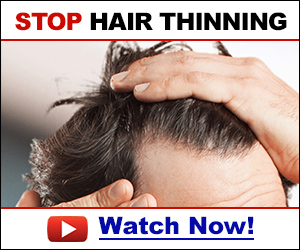

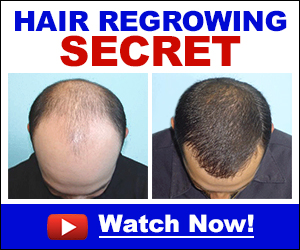
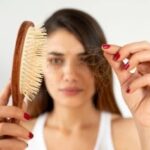
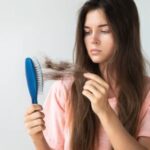
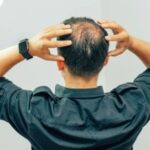

[…] Folifort offers a range of benefits for those looking to combat hair loss and greying: […]
[…] How to Stop Hair Loss Diffinitively […]